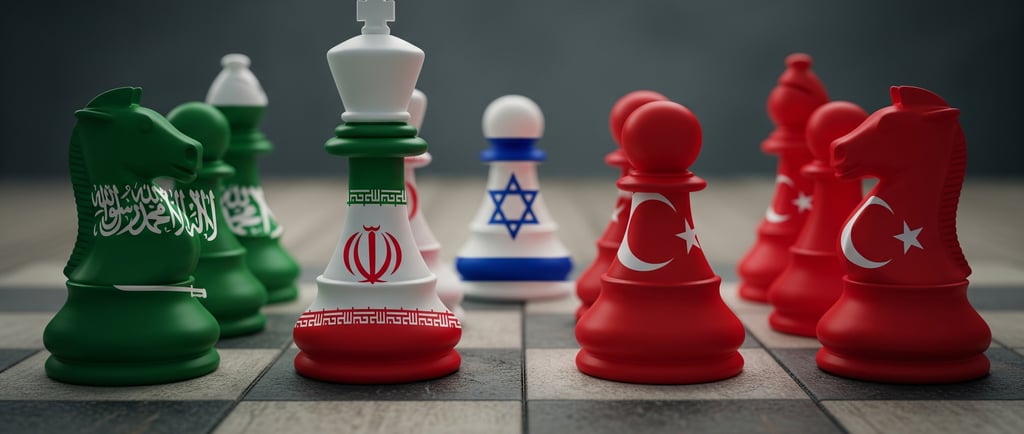Post-War Middle East: Will Iran, Turkey and Arabs Unite?
This article examines how the Israel-Iran 12 day war has triggered a broader strategic shift in the Middle East, where Iran, Turkey, and Arab states face mounting pressure to move from rivalry to pragmatic partnership.
Bilal Nour Al Deen
6/26/20253 min read


The recent confrontation between Israel and Iran has paused—at least for now—but what it revealed goes beyond missiles and airstrikes. It was a moment of deep geopolitical recalibration in the Middle East, not merely a military incident, but a comprehensive regional test that exposed existing fractures, rising ambitions, and forced recalculations. With both Tehran and Tel Aviv absorbing painful blows, the region enters a new phase—no longer governed by ideology, but by the instinct for survival and shifting power dynamics.
Israel’s Strategic Show of Force
Israel’s campaign against Iran’s regional infrastructure was not solely about neutralizing threats; it was also a show of capability. Precision strikes, cyber warfare, and intelligence operations built on deep data disrupted Iran significantly. Though they did not topple the regime, they set it back years within hours, despite Iran’s launch of devastating missiles. More importantly, Israel sent a clear message to both rivals and allies: we can reach you, act swiftly, and withstand the consequences.
That message now echoes in Arab capitals, where officials are reassessing their position and wondering whether Israel’s rise as a regional power will come at the expense of their autonomy. For those regimes, the question is no longer just how to contain Iranian influence, but how to tame the rampaging Israeli bull since October 7, 2023.
Tehran at a Strategic Crossroads
Meanwhile, Tehran finds itself at a strategic crossroads. Its long-standing doctrine of “forward defense”—supporting allies and proxies in Lebanon, Syria, Iraq, and Yemen—has taken a severe hit. What was once a strategic asset is now a burden dragging Iran into conflicts it can no longer control or finance. The election of President Masoud Pezeshkian introduced a softer tone—less revolutionary, more conciliatory. His call for a “strong region” based on cooperation rather than dominance reflects an awareness that isolation is no longer a viable option.
Iran’s goal today is no longer expansion, but survival. This necessitates reopening channels with its Arab neighbors. Outreach to Arab states that share its faith may offer a lifeline. This is not a peace offering—it is self-preservation. This Iranian overture is likely to be met with a mix of caution and pragmatism. For Arab rulers and their people, Iran has long been viewed as a threatening adversary. Yet with Israel’s rise as a force willing to use unrestrained military power, it may be in Arab interests to reconsider their disputes with Tehran. A weakened Iran is easier to contain than a defiant one.
Will Realism Win Out?
Still, deep rifts remain. The historic hostility between Iran and the Gulf is not tactical—it cannot be papered over with a handshake. The memory of the 1979 Iranian Revolution, the Iran-Iraq War, and decades of sectarian conflict still lingers in the minds of decision-makers. Arab states also remain wary of Iran's support for Shiite militant groups such as Hezbollah in Lebanon, which they strongly oppose. On the Iranian side, the deep ties many Arab states have with Israel and the United States continue to raise suspicion.
As for Israel, it now stands on the threshold of an unprecedented phase. Having demonstrated its status as the region’s most capable security actor, it now faces a new challenge: how to balance assertiveness with not becoming a regional burden. The more Israel expands its security dominance, the more it stokes its neighbors’ fears. In other words, Arab engagement with Israel may remain cautious, driven by risk-balancing rather than allegiance.
What is emerging today is not a new order, but a new realism. The Middle East is no longer a stage of fixed alliances or permanent enemies. It has become a web of shifting relationships governed by immediate interests, not grand ideologies. Iranians and Arabs may not become allies—but they may become reluctant partners in the game of survival. And while Israel may be ascendant now, it must beware the dangers of overreach, as the gap between power and acceptance can be fatal.
Turkey and Iran: A Pragmatic Alliance of Necessity
As for Turkey and Iran, despite their relatively stable relations, they now stand at a crossroads: either reinforce historical rivalry or build a pragmatic axis. Tehran sees Ankara as an economic corridor to break isolation, while Ankara views Tehran as an energy partner and a counterweight to Israeli expansion. Yet centuries of mistrust, proxy conflicts, and shared Kurdish anxieties hinder deeper cooperation. Failure to close that gap means forfeiting influence to Israel—and turning geopolitical competition into mutual strategic retreat.
The guns have fallen silent—at least temporarily—but the political battle has just begun. The Middle East is now shaped by a new logic: power is measured by adaptability, not by arsenal size. No actor can dominate entirely, and none can fully trust the others. It is a game of balance, where every player is both actor and bargaining chip.
Contact me via email
SUBSCRIBE TO MY NEWSLETTER
hello@bilalnouraldeen.com
© 2025. All rights reserved.